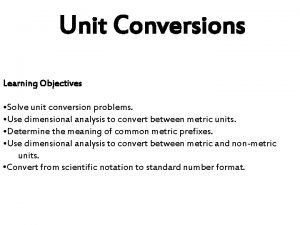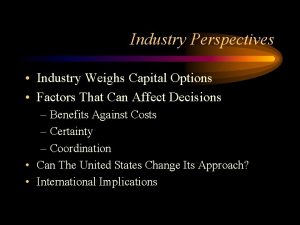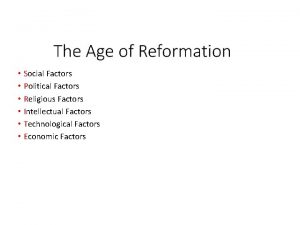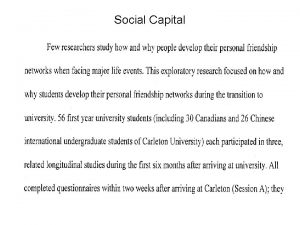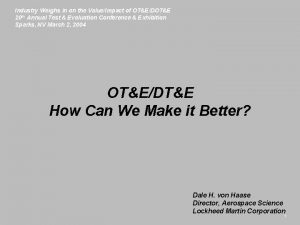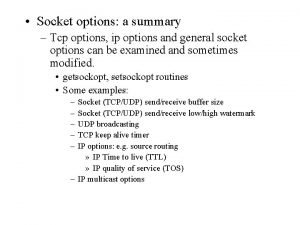Industry Perspectives Industry Weighs Capital Options Factors That

















- Slides: 17

Industry Perspectives • Industry Weighs Capital Options • Factors That Can Affect Decisions – Benefits Against Costs – Certainty – Coordination • Can The United States Change Its Approach? • International Implications

Industry Must Choose • Industry regularly must choose between competing projects • Never enough capital to do all projects; must weigh project benefits against timing to completion • Regulatory framework a potentially critical factor in making the investment choice

Factors Affecting Decisions • Benefits Against Costs – Environmental regulation manages risk – it does not prevent or eliminate all risk – Consequently, environmental laws that prevent or diminish the balance between benefits and costs create problems – Clean Air Act • Ozone Standard

Factors Affecting Decisions • Clean Air Act requires EPA to set National Ambient Air Quality Standards: – (1) National primary ambient air quality standards, prescribed under subsection (a) of this section shall be ambient air quality standards the attainment and maintenance of which in the judgment of the Administrator, based on such criteria and allowing an adequate margin of safety, are requisite to protect the public health.

Factors Affecting Decisions Overview of National Primary Ozone Standard Year Standard Set Level Averaging Time 1971 0. 08 ppm. 1 -hour 1979 0. 12 ppm 1 -hour 1997 0. 08 ppm 8 -hour 2008 0. 075 ppm 8 -hour

Factors Affecting Decisions • Public Perspective – Expectation of Success: Attainment is an absolute requirement – Sense of Fear: Failure to attain leaves health at risk • Reality – Virtually no major US city meets the ozone NAAQS and hasn’t for 35 years – The health risk is primarily among a small but susceptible portion of the national population

Factors Affecting Decisions • Political Dynamic – Attainment is a state responsibility – even a local one – Most cities’ emissions are dominated by transportation sources; no elected official wants to tell voters to stop driving – Politics drive two directions – get motor vehicle emissions reduced by manufacturers and find new industrial sources to regulate • One is a national process; the other leads to expanding the regulatory areas to find new industrial sources to regulate – With attainment unrealistic, costs keep increasing because there is no stopping point

Factors Affecting Decisions • Certainty – Environmental management involves substantial investments – When investments are made, there needs to be a sense that requirements will not change quickly or unpredictably – Projects compete for capital – many on a world scale – when certainty is absent, capital will flow elsewhere – Clean Air Act • New Source Review

Factors Affecting Decisions • New Source Review – Clean Air Act structure includes requirement that new industrial facilities use new technology – New Source Performance Standards – Modifications create a challenge • When modifications increase emissions, general view that technology upgrade required • NSR issue became focused on whether modifications that did not increase emissions should also require new emissions technology

Factors Affecting Decisions • New Source Review – The hard choice – a facility that improves its energy use: emissions do not increase but throughput does – From industry’s perspective, does the policy encourage additional investment or does it compel substantial new control costs without a return on those costs?

Factors Affecting Decisions • Coordination – Some environmental challenges are more significant than others – Driving environmental management from multiple uncoordinated directions • Strains capital demands • Produces burdens that are inconsistent, driven by different standards • Can overwhelm the compliance process – Can seem to be regulation for regulation’s sake

Factors Affecting Decisions • Coordination – Oil and gas production • • SPCC – Clean Water Stormwater – Clean Water Aggregation of sources – Clean Air Small engine regulation – Clean Air – Burden – particularly on small businesses – can be overwhelming and discourage continued operation of marginal wells

Can the US Address These Challenges? • Environmental policy in the US is driven by a myriad of laws – Clean Air Act, Clean Water Act, Resource Conservation and Recovery Act, Safe Drinking Water Act, Superfund – Congress develops laws through its committee process; committees jealously guard jurisdiction – Laws set different environmental standards and different technology requirements – Laws do not allow trade-offs between different media – Providing some trade-off capability would run counter to environmental stakeholders in each area – “backsliding”

Can the US Address These Challenges? • Unlikely that Congressional structure and political will would allow any modifications Congressional Jurisdiction Environmental Law Senate Committee House of Representatives Committee Clean Air Act Environment and Public Works Energy and Commerce Clean Water Act Environment and Public Works Transportation and Infrastructure Resource Conservation and Recovery Act Environment and Public Works Energy and Commerce Safe Drinking Water Act Environment and Public Works Energy and Commerce Superfund Environment and Public Works Energy and Commerce & Transportation and Infrastructure

Can the US Address These Challenges? • Federal structure – Federal laws set national structure – States largely regulate under a delegation process – States can generally be more stringent than the federal laws – Unlikely that the federal-state relationship will change

Can the US Address These Challenges? • Adversarial Society – All permitting decisions subject to judicial challenge – Project opponents regularly challenge decisions • Challenges generally increasing – Unlikely that judicial options will be changed

International Implications • Industry choices increasingly international • Countries that provide a more straightforward set of options can pull investment
 Phân độ lown ngoại tâm thu
Phân độ lown ngoại tâm thu Block xoang nhĩ ecg
Block xoang nhĩ ecg Thơ thất ngôn tứ tuyệt đường luật
Thơ thất ngôn tứ tuyệt đường luật Thơ thất ngôn tứ tuyệt đường luật
Thơ thất ngôn tứ tuyệt đường luật Walmart thất bại ở nhật
Walmart thất bại ở nhật Tìm vết của mặt phẳng
Tìm vết của mặt phẳng Hãy nói thật ít để làm được nhiều
Hãy nói thật ít để làm được nhiều Tôn thất thuyết là ai
Tôn thất thuyết là ai Gây tê cơ vuông thắt lưng
Gây tê cơ vuông thắt lưng Sau thất bại ở hồ điển triệt
Sau thất bại ở hồ điển triệt What is the answer
What is the answer Find the mass of a football player who weighs 1250 n
Find the mass of a football player who weighs 1250 n What weighs a kilogram
What weighs a kilogram What weighs a gram?
What weighs a gram? A deflated hot air balloon weighs a total of 8000 n
A deflated hot air balloon weighs a total of 8000 n How to solve conversion problems
How to solve conversion problems What weighs more a kilogram of feathers
What weighs more a kilogram of feathers Pressure is the force per unit
Pressure is the force per unit















